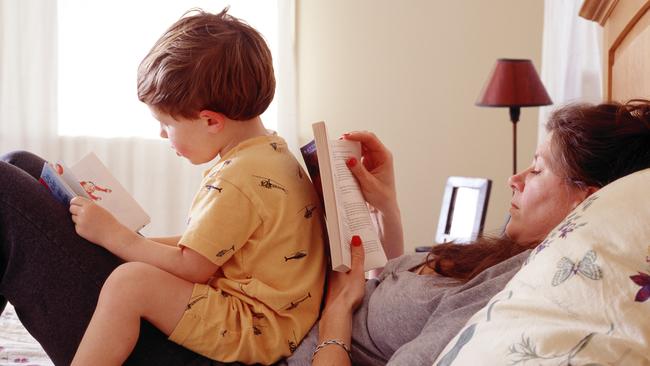Why you shouldn’t teach your child to read
Parents who want to help their children to read and foster a lifelong love of books need to forget about teaching and instead focus on fun and family time, say experts.
Advice
Don't miss out on the headlines from Advice. Followed categories will be added to My News.
Teaching a kindy kid to read isn’t always as easy as ABC, and it can take the whole year for it to ‘click’. But we asked the experts and there are ways to speed up the process, helping your child jump reading level after reading level.
Here’s how:

Don’t ‘teach’ at all
As soon as you start to ‘teach’ the child to read, a totally different relationship develops, says famed children’s author and literacy expert, Mem Fox.
“It’s no longer a loving relationship, it’s a slightly tense relationship — it’s a relationship on the side of the adult who panics if the child and doesn’t pick it up immediately,” she said.
“It’s resistance on behalf of the child if a child doesn’t pick it up immediately.
“They can sense the tension from the adult — the whole thing changes.”
Early education: Kids could become students at age 3
School smarts: 10 questions to ask your child’s teacher
Make it what it is — make it fun
“If the child is absolutely fascinated in a book there are lots of games you can play — ‘how often do they say green in this book? Let’s count the greens’,” said Fox, the author of Where is the Green Sheep?.
“That’s focusing on the word green, like a game.
“In certain books the child becomes able to predict the end and the child arises naturally — it’s not a bitter teaching sort of relationship.
“It’s fun, it’s lovely, it’s fantastic.”
Read aloud, and often
Set aside time to read aloud with your child regularly — every day if possible.
Reading aloud with children boosts their spelling and reading comprehension ability, as well as their vocabulary.
“Most importantly, children love it,” said James Wells, of Kumon, which runs education centres across Australia.
“Reading aloud with your child provides one-to-one time for them to bond with their parent or caregiver.
“This significantly benefits students’ reading ability, as they begin to associate reading with happy family memories, making them more likely to develop interest in and enjoyment of reading.
“This positive association provides significant benefits by providing internal motivation for children to try even harder with their reading, helping them jump up reading levels.”

Ditch the iPad and let books be the babysitter
According to research published in the journal Social Science Research, a home requires 80 to 350 books for children to reap the benefits. Fill your home with hard copy books. Keeping your home’s bookshelves stacked sends the message to your children that they live in a home that values learning and reading, which will help your child develop an interest and enjoyment in reading, as they can see that their family is also interested.
“Hard copy books are preferable, as these are physical objects that children can hold, see and touch — it also diverts their attention away from e-readers and tablets which offer distractions such as video games and social media,” Wells said.
“Toru Kumon, the late founder of the Kumon Method of learning, always said that when it comes to entertaining children, books are preferable to electronic screens.
“He said, ‘Let books babysit your child … when children enter the world of books they will come to learn more about life and society, things that will help them lead fuller lives’.”
Take a trip the local library
Libraries are an easy and free resource for new reading material for your children. Let your children choose their books — within reason, as they will more likely want to read something they are interested in. Many libraries often have community events or regular story times to get youngsters reading, and letting them have their own card and do the check out themselves gives them independence and responsibility for their reading.

Keep on top of your child’s progress
Be aware of what they’re reading, how much reading they’re doing and their reading strengths and weaknesses. Any support you offer to your children will likely be of limited value if you don’t know where they need support.
If you’re unsure, ask their teacher. While not too much emphasis is placed on reading levels in a classroom situation, parents can find it helpful to see where their child’s ability sits with their peers. If they are on level five but need to be on level 12 by the end of the year, it gives you both a goal to work towards.
Consider extra support
This applies if your child is falling behind, or if they’re racing ahead and want some extra work to develop their ability even further. Consult your child’s school for advice. If you’re considering tuition, it should be personalised to your child’s needs. This will help strong readers jump ahead even further, and for children facing difficulties, will provide the needed time to build a solid foundation in literacy.
If it’s not clicking — seek help
If you suspect that any reading difficulties may be due to your child living with a condition such as dyslexia, consult a medical professional and follow their advice on the best way to support your child.
Originally published as Why you shouldn’t teach your child to read


